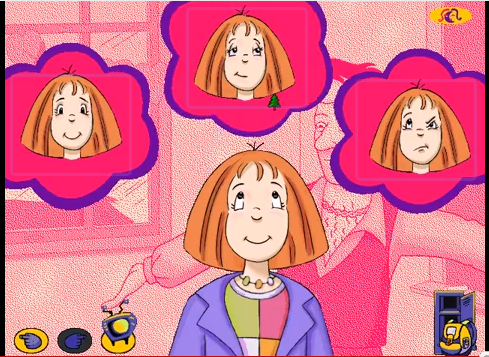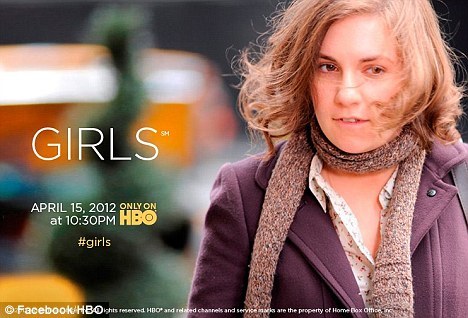In February, I wrote about a type of story that populates a lot of television that I dubbed "l
ikeable people doing despicable things," it asked the question:
Why do we like despicable people? What about them is likable enough
to make us seek them out? Do we aspire to their freedom from obligation
and the constraint of morality? Are we watching a car accident as it
happens?
I had an extremely powerful negative response to the show
Girls watching the pilot on HBO. Obviously,
I'm not the only one in the world who felt this way. Plenty of people have weighed in in this show's first week about it's content, the comportment of it's creators and so on. To go into this a bit more I want to talk about some personal choices I make when I look at new storyworlds both for work and in my personal life.
At work, I try to give everything I see a fair chance, one of the reasons I've had success is because I will read things beginning to end regardless of my initial response. At home, I am not so forgiving. I turn things off, it's hard for me to do so with films and TV shows, I still want to give things a fair shake, but sometimes I simply cannot continue watching something because I am in my own, entirely controlled sphere of influence, and I have complete power to determine what I am doing with my time at that moment.
When do I turn things off? Looking back on storyworlds I've done this with in the past I can pick out some very specific things that I pick out that guides what stories I want to consume and let into my home. Here are the two criteria for me turning off your story:
- "If this person or event were occurring in real life, I would have to as a bystander step in and confront it"
- "I could not tolerate this behavior consistently from a person standing in a room, and the characters in this fictional community are acting in ways to address the behaviors I don't want it around me casually"
I apply these rules to my own narrative consumption and try to hold myself to the same standards I apply to guidance of my children's media consumption. This doesn't mean I don't watch some horror, or even some reality shows. I love stories, I love stories that challenge my viewpoint, and I'm willing to give a storyworld a second chance after testing my opinions of what I've turned off with my own community of colleagues and friends. I'm perfectly willing to be proven wrong by a narrative demonstrating how a character I find repulsive grows into something new, but that also does not mean I have to invest my time in it when I find it extremely stressful to engage with it.
I try to seek out stories that inspire me to be a better person, to strive to improve myself, and to help me make decisions in a way that is considered, compassionate and forward-looking that can be positive for everyone around me. I know that stories have been the driving force in my life to fight against injustices around me, from behaviors that make life more difficult for those around me and that get in the way of my own goals.
When watching Girls, I saw characters whose intentions appeared to be the exact opposite of those ideas. The characters are not women I would want around me at my side in life and I didn't want them on my screen either. I know that I have self-selected a community of people who I hope are like me ethically, morally and in terms of their aspirations, and frankly, in real life I don't know many women like the characters in Girls on that moral/ethical level. This is a gripe that I hope resonates with men and women of all
ages who have seen versions of their own "type" in stories that they
have also found frustrating and limiting.
Even more recently I learned about a book coming out about one of my greater passions, the way stories act on the mind, to persuade, activate and encourage people to live their lives. The elaborate metaphors that we call stories are how we teach one another about ourselves and the world we live in. Their power is profound and when we create, we should remember that. This is, I think, why stories like those in
Girls get my goat so much. From the
Fast Company article Why Storytelling is the Ultimate Weapon:
Guber’s book is relentlessly optimistic about the power of story to
persuade. But as the bloody metaphor of the Trojan Horse suggests, story
is a tool that can be used for good or ill. Like fire, it can be used
to warm a city or to burn it down. Guber understands this, but he
emphasizes story’s ability to bring on change for the better. His book
is about people who tell good stories to overcome resistance, usually
for laudable reasons. But, approached from a slightly different angle, Tell to Win is a book is about highly capable, experienced professionals suckering for story over and over (and over) again.
So there are two big lessons to take from Guber’s book and from the
new science of storytelling. First, storytelling is a uniquely powerful
form of persuasive jujitsu. Second, in a world full of black belt
storytellers, we had all better start training our defenses. Master
storytellers want us drunk on emotion so we will lose track of rational
considerations, relax our skepticism, and yield to their agenda. Yes,
we need to tell to win, but it’s just as important to learn to see the
tell coming--and to steel ourselves against it.
What are stories of unlikeable people persuading us about? Stories with immaculate heroes can be just as damaging if they aren't asking their audience to think about something or to dream bigger or to learn something new. We're inundated with stories and by seeing how powerfully they affect us, must take up control of our own habits in deciding what and who we want to be, and how we want to be effected by metaphoric communication. In addition to picking up
The Storytelling Animal, I highly recommend
The Information Diet. You are defined by your actions, but you are also defined by the stories those actions inspire and the stories you share and create with others.
I turned off
Girls, it gave me a horrible feeling in my stomach that
certainly had something to do with how it was portraying girls who are a
little younger than me, but as young-adults in New York, do
reflect a bit of my personal reality in a way I find objectionable. Real people usually grow out of these behaviors, and I suspect that over the course of the slated two seasons of
Girls, the characters will as well. I won't be turning in every week to find out. I'm happy to talk about it and I'm glad the narrative has inspired so many young women to question how they are being represented in a storyworld and to openly discuss it in public forums. This should be the goal, conversation and questioning what we're being shown.
I have respect for
Lena Dunham and her
personal story, it takes a lot to be able to write, produce, act and
create a film and television series. Kudos. I don't like your characters or their motivations but I did find the uncomfortable
sex to be both uncomfortable and a surprisingly honest moment in the
portrayal of sex on screen. She is pushing us all forward to create more
and to show that it's possible to create stories, to hire women in the entertainment industry, to get hired, and to create successful work. That doesn't mean we have to like that work, we can hold her stories to the same standards we hold everyone else to and if we don't like something, turn it off.
The entire point of the independent piece,
Jurassic Park Slope, I've spent two years creating with co-producer and co-author
Steele Filipek, is that we can have fun making a storyworld that will inspire others to do better than we did this time. Also, to bring some laughter and joy along the way because collaborating and creating can be immensely fun when you share it. It's an intentional low-budget monster movie because we love making that, and the people we created with all rallied around the idea of a comedy that would allow it's audience to easily plug their own stories into the world.
What I want to take away from shows like
Girls and I hope others can as well is that stories that misrepresent or do not represent you may be out there but ultimately you define who you are in response. You determine what stories you let in, share in, and you define what stories you create in real life and in your own work.
We can all do better.



